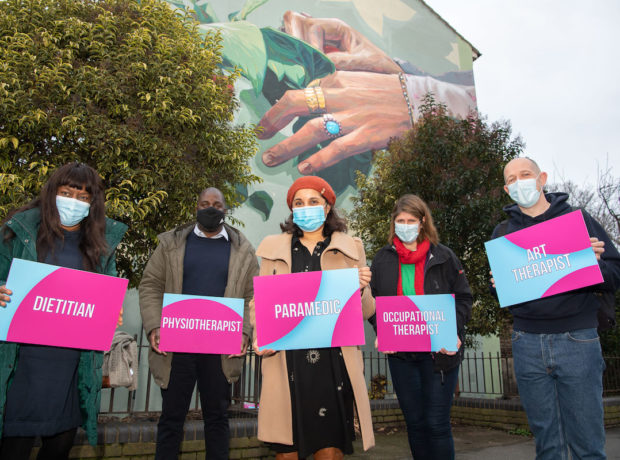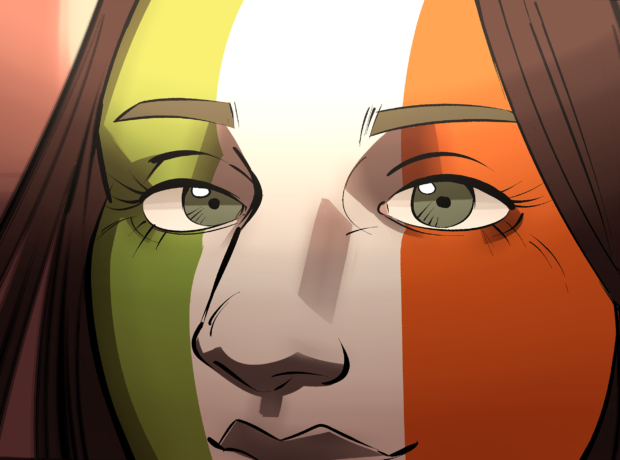In this story, the writer highlights the hotly contested subject of gentrification and its subtle nature, asking when the celebration of culture turns into the commodification of culture. She asks how gentrification affects the social and cultural fabric of communities, and their sense of identity.
This piece was originally written as a response to one of the themes of the Writing Human Rights module at the University of Warwick. Having grown up in Croydon, Victoria Etteh bases this story in her hometown, reflecting on the double-edged nature of gentrification.
“Youth is wasted on you young people.”
Sparse brows knitted together, and an icy moustache sprouted against the deep mahogany of his skin. His words, uttered in confidence, were then repressed and swallowed by winter’s lethargy.
I’d never seen my dad cry before. He watched me and I watched him.
Wrinkles sprawled from the corners of his eyes so deeply rooted in tradition. I pulled at my braids, ripping off the tangles at the end. His lips were confined again into a tight frown, sealed shut by salty tears. But then –
“Sorry.”
Said in a brief moment, brusque and burning, and attacking like a pungent spice. Or perhaps that was from the stew bubbling on the stove. This was the first time I had heard my dad apologise. My jumper suddenly became scratchy. The dining table, where we sat, evidently hadn’t been wiped down in a while. To the right, with nicks and blemishes scattered along its edges, the sideboard was cluttered with keys and letters and family photos. In one, my mum had me in a soft hug as I sheepishly smiled at the camera because I had just made a fuss about wanting to put candyfloss in my hotdog at the funfair.

I awkwardly filled the silence.
“Sometimes, I see her in my dreams, and we talk. And sometimes, I see her in the crowd in my hometown that I’ve never been to. And every time, I forget they’re both gone.”
I could have made the snot run back up my nose, the tears flow back up his cheeks. I looked into his blank canvas and the colours shifted from me to him.
Mum would know.
His tears, my hesitation. Mum would know. This town, so watered-down. Mum would know.
On the bus, I pressed my face against the window, drinking in the unfamiliar sights. My eyes traced the transforming landscape of Shoreditch receding into the contours of my hometown. The blanketed sky cast a fog punctured by colonies of uniform blocks. These new “apartment complex” projects, towering and impersonal, were getting out of hand.

The bus slowed to a halt and I felt uneasy. It was like stepping into a familiar painting that had started to fade. The air felt like it smelt, soaked with smog and the wake of rainwater. The fumes dragged their fingertips through my hair. This place was once alive but now the swings and slides sat vacant, the playground emptied of its swarming climbers.
“Hi Dad.” I blurted, blunt and automatic, brushing through the clustered high street to meet him. His eyes were coloured by the sunset and yearning.
“How are you? How’s art school?” He replied, unable to meet my eyes.
“Pretty good, thanks. You?” My lips curled into an awkward smile and he grabbed my bags as we continued walking.
“I haven’t seen you in a while.”
“Yeah, it’s been a while.”“You’re too busy to keep in touch?”
“Last time I came, we didn’t leave on the best terms.” His eyes met mine.
“Because you always bring up that gentrification political rubbish,” he said as we passed the fifth artisan coffee shop in a one-mile stretch.

“Yeah, because it’s killing this place.”
“Can you calm down?”
“But this place is so different now! It feels weird. I don’t know.”
“Things change. And you haven’t been here. Don’t you think the roads look cleaner and the parks look nicer?”
“But we lost our food market to one of those wholefoods stores. Nobody here even eats whole-grain seeded sourdough and, oh my days, how much coffee do these people even need?”
“I don’t know.” He retorted, insincere and detached.
“I just wish we could have the investment without being priced out. Not like I’m asking for much.”
“So, what do you want us to do? I still have to go to work and pay the bills and deal with your mum’s debts. We still have to live. Nobody has time to care.”
Hiding my annoyance, I paused.
“Er… I’m gonna spend some time in town now but I’ll see you back home in time for dinner.”
He cast a concerned look.
“I just wanna refresh my memory, that’s all. This place is practically unrecognisable.” I let out a dry laugh. He opened his mouth and closed it again, silent for a few beats.
“Ok.” And then he walked, absorbed into the crowd.
I did what I always did. Twice every year as the calendar marked the birth and passing of my mum, I found solace in buying a hibiscus tea and meat pie from our favourite African diner.

It lay tucked behind an underpass. The building’s edifice was all wood and stone with grime burrowed in the cracks of the exterior. It boasted more in flavour than its modest size could suggest.
But when I nipped behind the underpass, I found a salad and juice bar nestled in its place. Polished surfaces and lime green veneer.
My eyes darted across the menu, frantically searching for something familiar. Familiarity like the hibiscus tea that would dance between sweet and tart; that would send a soft spicy punch hitting the back of my throat; that would trigger a cough and reveal a crimson tint on porcelain teeth.
My mum would gush over the flakiness of the pastry and the juicy heart of the pie because she could never get that balance quite right.
And I’m meant to sit alone, sipping the tea which held the essence of her spirit and eating the pie that was a testament to her endearing imperfections.
It was a way to feel her presence, tangible as the steam rising from the cup in my hand. So tangible that the steam’s fragrant air swirled to resemble her face –
“Excuse me, would you like to order?” With her hair artlessly gathered into a loose ponytail, the worker’s outward appearance spoke of an inner weariness, a weariness that was pervading the town.
I opted for a “Red Supreme” smoothie and a “Pan-African Spice Pocket” pie. Both were bland. I could see my culture, but I couldn’t taste it. I paid in coins, a button among them, and the cashier didn’t even notice. After I finished, I said “thank you” and bit my cheek.
It was dusk now and the setting sun gave way to an icy twilight. The street was sporadically populated, and the bitter air seeped through my clothes, settling on my skin. Unready to return home, I found myself craving endless solitude.
I walked down the street, haunted by the ghostly grey plastered on every storefront, like in a videogame when an area is desaturated until discovered.
I passed by the old Allders department store where we were promised a Westfield as a fair exchange. My mum would hint I should apply to work there, jokingly condescending. I said I’d work on my CV to placate her. Allders had been rotting for years, and I remembered her in the strangest of times.
I ruminated my way home, pausing at the doorstep. The percussive draft of scotch bonnet and bouillon powder kicking through the door crack.
“Mmm. Smells like the market in here. Are you making chicken stew?” I shouted from the doorway, hanging my coat and bags on the peg.
“Yeah, you hungry?”
I found him standing above our treasured cast-iron pot, kitchen littered with peeled bell peppers, onion skins and the spirit of ambition amongst other spices. The yellow haze from the lightbulb basked the scene in a low even glow.
“Sure,” I told him. “I could do a better job though. Mum was the one who dragged me through Surrey Street market, not you,” squeezing past, to place plates on the dining table.
“True, but lots of those stalls are gone now. Finally, it won’t smell of rotting vegetables on a Sunday.”
Read more: “If you can see it, you can be it”: The impact of Black role models and Black creative spaces
“Yeah, but it’s like we’re some wannabe Shoreditch with that Boxpark.” The pot on the stove bubbled. Sometimes I wished I didn’t have such a quick mouth.
“Croydon deserves to have nice things.”
“I didn’t say we couldn’t.” The pot’s lid rattled.
“We can’t stay stuck in 2003? You do know that?”
“I literally know that. Don’t you think it’s out of touch? The council and government promise they’re making it better. But it’s not better for us, is it?”
“Luxury isn’t for us?”
“You know what I mean. Dad, they shut down the food market stalls and replaced them with shops selling £200 belts… makes no sense. But then they use our same food to make those cute little brunch spots that visitors love. You’ve never even been to one of those restaurants and I know you don’t know anyone who has. So no, the nice things are not for us.”
“So, you want quality to improve without the prices going up? And can you blame people for coming here? Gang crime is improving and it’s easier for me to get to central London. People just want a nice place to live. You’re too… one kind, just calm down!”
“We should all be able to have a calm neighbourhood without being priced out. It’s more than the shops and stuff. The high street is genuinely dying out, like there’s no identity. I don’t know, this place used to be popping off. Dad, it’s so peak.”
“Can you actually speak with words I understand? Peak?” The stew pot hissed.
“Fine,” I sighed and sat down at the table. “The nice things are to bring in the rich people because what do we have to offer other than diversity,” I spat out a stinging last line.
“I wanted to have nice things too. I wanted to take your mum to all those nice places and buy her £500 socks if I could. She always joked about how if she could, she would buy one of those checkered scarves ever since she saw it on Oxford Street.” His movements slowed.
“Burberry?”
“Yeah, the berry scarves. And you know, I drove home from work and saw the scarf in one of those shop windows. But now the nice things are here, and your mother is gone.” He coughed to mask the tremble in his voice.
“Dad I-”
“Things change all the time.”
“But don’t you wish people like you and me and mum were part of that change?”
“If you wanted to be part of it then why did you leave? Because Croydon is too rough for you, because it’s holding you back and it’s not as artistic and fancy and cool enough for you? It’s all we could afford.”
“You know I had my reasons.”
“No, no, when you’re in your student art town do you not eat at restaurants and brunch spots and buy your vintage quirky yahoo jewellery?”
“But…. It’s different. I’d been here too long. I didn’t want to be trapped here. And this place was getting too much – the violence, the crime, the drugs. But you had to make it a big deal. You just couldn’t let me do what I’ve always wanted to do in peace. Because it’s not engineering or law or med-”
“Don’t raise your voice-” he turned back to the stove.
“Because you’re embarrassed of me!” The pain in my throat cracked in my voice.
“And Mum was the only one who understood. And now-”
“You’re stuck with me?” He continued stirring the pot, back facing me, burying his face in the steam.
I only now noticed that the fire had been off for a while. In the reflection on our framed family photo, my eyes met my judgemental glare.
“It’s okay to cry, Dad.” His silence as he served up the stew offered an invitation to continue.
“I’m sorry… but we don’t ever talk about it, and we don’t talk about her. This town is all I have left of her. And it’s not even the same anymore. It’s so bland and alien and I know it sounds dumb, but I look for pieces of her everywhere here.”
He turned around, quiet. I waited patiently, recognising that look of humility.
“I do too.” His gaze lost focus and I could tell he’d dissolved into memories of her, so I let it go. My fingers rhythmically tapped the table.
As my dad placed the bowl of stew in front of me, I saw wisps of my mother’s face again in the fragrant steam. He sat across from me. I knew he couldn’t tame the drum in his chest.

I took the first bite. The deep-red silky sauce was painted over the fluffy white rice in a peppery salt surrender. And in the background, smoky undertones from its grilling bled from the tender chicken’s juices.
It was a beautiful harmony of flavours, hitting notes only my mother could sing.
“It’s decent.” I teased. He let out a light laugh, ephemeral.
We whispered “Amens” over the food. He took a bite and the sepia tones of the past flicked through the curtains.
We stood outside for hours that next morning, something I’d never done before, just to weep in the wind, hoping to see traces of her face somewhere behind closed eyes.
“You know,” he began, his voice stifled by a small sob, “I pay her phone bill every month, so I can
hear her voicemail. It’s a bit… peak?”
My lips curved into a soft smile and the sun hung in the sky for longer than its given time.
All artwork by Isabelle Broad.
Read more:


